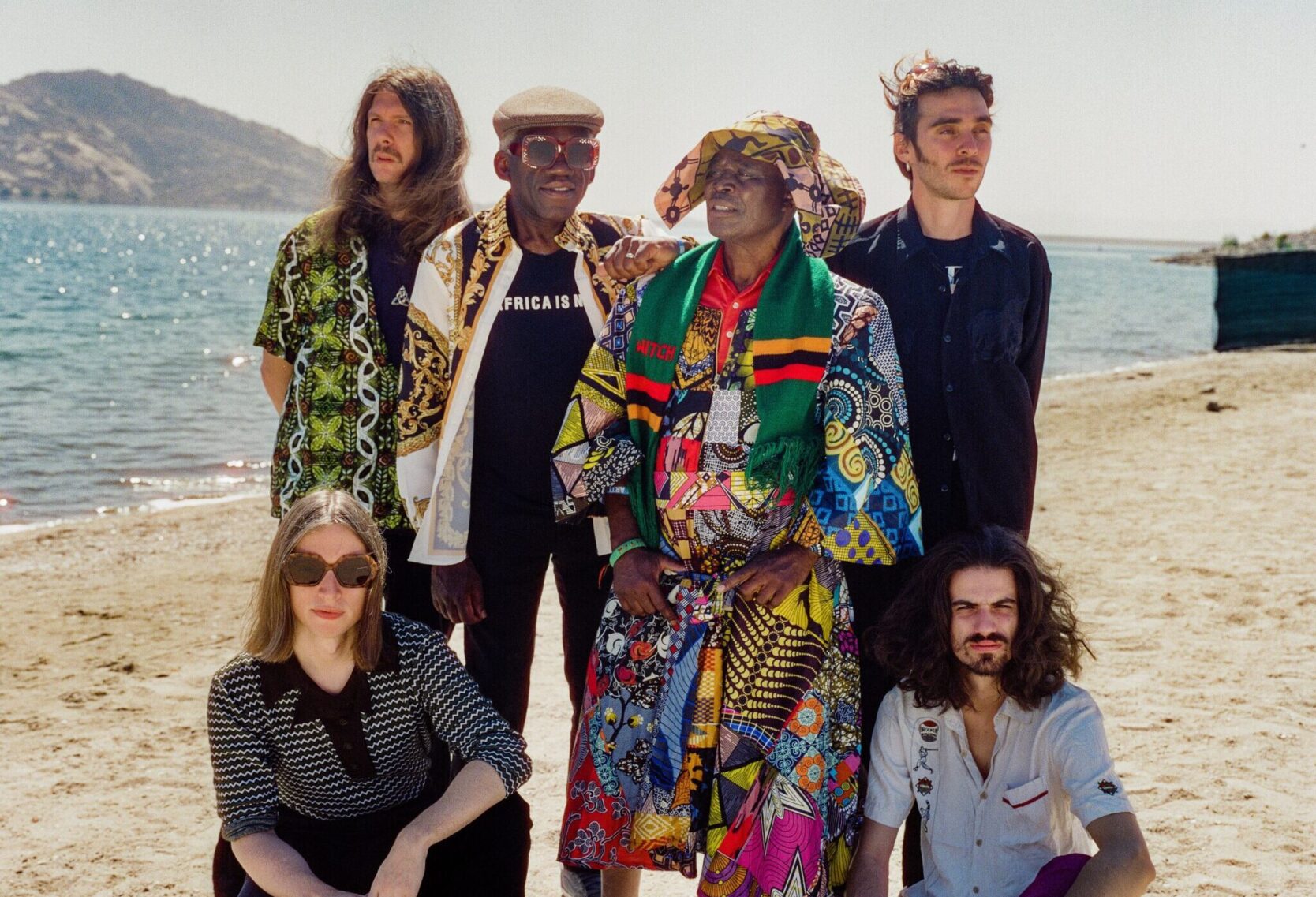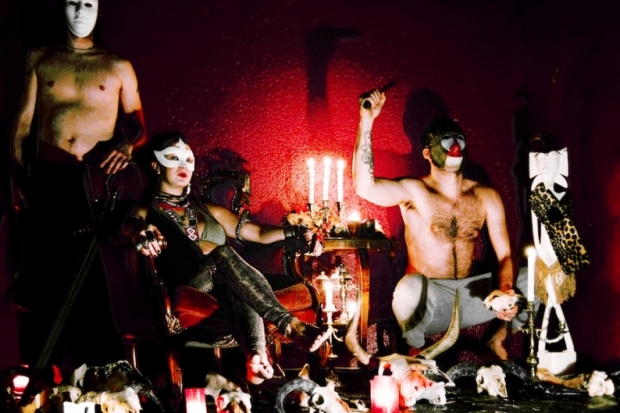A Stratocaster howls over African percussion, psychedelic licks, chugging garage rock, funk-laden keys and backing vocals sweeter than honey. Behind a glistening afro and mega-watt smile, 71-year-old WITCH frontman Emmanuel “Jagari” Chanda tears into material from Zango, the band’s first album in 40 years.
“Like the story of the phoenix, the bird from the ashes. Zamrock has resurrected from its decades of slumber!” Jagari bellows the opening lyrics of “Message From the WITCH,” and the East London venue where the band is performing erupts.
It’s dead of winter, and rain is pelting down on the pitch-black streets of the big smoke; but inside, Jagari is electrifying a cult following of new wave fans and day one devotees. On stage, he outpaces his younger bandmates, headbanging, jittering and shaking from the first beat. His infectious positivity permeates alongside the eight-piece band of Zamrock gods and goddesses who deliver WITCH’s back catalog of politically charged psychedelic Afro-rock and traverse new sonic territory in a performance so powerful it’s reminiscent of a spiritual sermon.
Kaleidoscopic spotlights swirl like a flower power fever dream. Under a tangerine glow. Jagari delivers a battle cry of unity and love to conquer xenophobia, hate and homophobia (a risky proclamation when homosexual sexual activity can still get you over 15 years in a Zambian jail). A sea of fists pump to the heavens amid wild applause as the diverse crowd rushes the stage in euphoric bliss and dances together long after the lights come up.
WITCH electrified a nation before. In the 1970s, their riotous sonic aesthetic, world-is-ours mentality, and bold moniker (We Intend to Cause Havoc) knocked locals for six and cemented their status as legends in every crevice of the country. Fans dubbed them ‘Zambia’s Beatles’ while their incendiary on-stage antics and seven-hour sets led to gargantuan local fame. But by the late 1980s, they were blasted by tragedy and into obscurity thanks to socio-political unrest, AIDS and, least of all, disco.
Fast forward to 2024, and the profoundly talented Zamrock trailblazers’ transfixing tale has taken yet another twist. Thanks to cratediggers exhuming their lost gems and reissues of their formidable output WITCH has clocked a global cult following for their pulse-racing musical prowess and sparked international label interest.
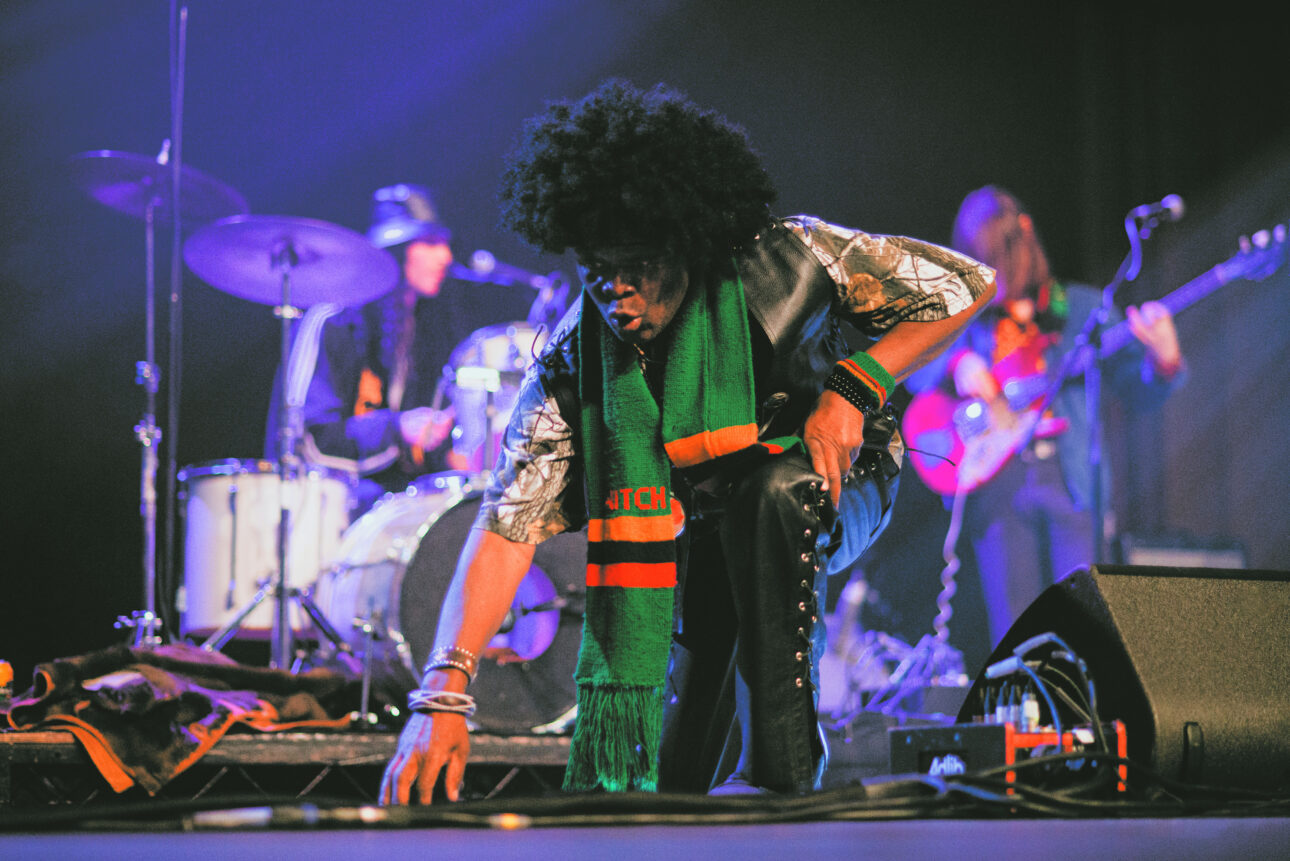
Back in London, the birthplace of the music that propelled them, Chandra (the last standing original member) and keyboard savant Patrick Mwondela (responsible for the band’s ‘80s disco resurgence) are more passionate than ever to wax poetic about WITCH’s rise, and fall, and rightful renaissance.
The story of WITCH begins in the 1960s. Chanda clung to copies of Melody Maker and scribbled down lyrics from his idols like the Rolling Stones, James Brown, Grand Funk Railroad and Black Sabbath, who pumped out of jukeboxes and radio stations.
“I grew up in Kitwe, the capital of the Copperbelt, Zambia’s booming economic resource. There were about six mining towns next to each other, each with a band or two. Mine had five or six,” Chanda says with a laugh. “The level was very competitive. In fact, during my time, anyone who called themselves a guitarist started by playing ‘Hey Joe.’ If you couldn’t play Hendrix, you weren’t good.”
By the 1970s, a spectrum of skilled musicians had formed bands, driving a feverish scene across the Copperbelt, such as the Black Souls, Peace and Fire Balls, Kingston Market, The Boyfriends, and Upshoots. “We all played the same music, had the same roadies, same girlfriends.” But there was only one band with relentless energy, technical ability and wild creativity that was out of this world: WITCH.
“When I got recruited as lead singer for the WITCH, I was the fresher! All the others were seasoned musicians,” Chanda says. “I didn’t belong to a band. I jammed with three or four local ones and performed for peers at school. I knew, if I was going to join a band, I wanted to be the frontman.”
Chanda studied how seminal American lead singers and British rock stars interpreted the music and how he’d put his spin on seminal hits like “Satisfaction.” But he makes it clear he was no copycat. “People nicknamed me Jagger! But I didn’t want to be in another man’s shadow, so I added the “i” and Africanized it to ‘Jagari’!”
To youth like Chanda, the bold sound of Stratocasters and mastering Mick’s moves symbolized the feeling of freedom after the country became independent from the U.K. in 1964. Zambia’s economy was booming and the country was ready to party.
But President Kenneth Kaunda marked the moment by stipulating that 95% of music on the radio must be of Zambian origin. This fueled the blazing Zamrock movement, which fused Kalindula and other rich African percussive rhythms with riotous, Deep Purple and Stones-inspired rock. Bands added local cadence to covers of “Sympathy for the Devil” and Grand Funk Railroad’s “We’re an American Band” (or “We Are a Zambian Band,” as WITCH played it) and wove local dialects with English licks.
“We started using words like ‘Baby’ and ‘That’s My Chick’,” Jagari chuckles. He composed the majority of WITCH’s output, including a handful of early hits he wrote in his schoolbook such as “Like the Way I Am,” “Off My Boots” and “No Time.”
“When we were learning our instruments and doing covers, we didn’t realize we were performing at a very high standard. We just matched anything and everything that we listened to on vinyl.” Patrick chimes in.
“We had nothing to measure our standards. When I watched Top of the Pops over in the U.K., I realized it was basically for anyone to have a go! Growing up in Zambia, we didn’t know that?! We thought we were behind the game!”
Studio sessions for the WITCH operated with the same dedication to mastering musicality; covers in the morning, break for lunch at 1 p.m., originals in the afternoon, and no girlfriends. All profits went towards new equipment, paying for the next recording, and small weekly pocket change divided among the band.
The band’s debut album, Introduction, blasted into national consciousness in 1972 and made history as the first commercial Zamrock record. It opened doors for other bands to follow such as Ngozi Family and Amanaz.
The album was released independently and is considered a ‘Holy Grail’ of the Zamrock movement for its mark on history including the intoxicating title track which opens with Jagari introducing and immortalizing the late members of the original WITCH ensemble. Only 300 copies were pressed and sold by hand by their manager at shows for a few bucks (today, they’re going for around €600 on Discogs).
Chanda and WITCH recorded five ferocious albums across the ‘70s (more than any other Zamrock band in history). Their third album, Lazy Bones, was released in 1975 by South African imprint Teal Records and eclipsed its predecessors by selling 7,000 copies. The LP was a brooding psychedelic opus and a dark masterpiece that was fused with wah-wah, fuzz guitars and relying as heavily on the stomping feel of hard rock as it did the syncopation of funk.
Jagari became infamous for his thrilling stage antics which ranged from wearing bras and women’s panties over his trousers tossed to him mid-set and jumping from balconies or off the stage. “The fans would catch me in the air!” he says. “Other times, I threw a guitar into the crowd during the show, and before it landed, it was torn to pieces.”
WITCH were stars. Police motorcades had to calm riots outside overcapacity shows. The roof was ripped off at one hall where they performed due to fans attempting to crawl through the windows.
“We grew to be very famous,” Jagari humbly giggles. “Not to blow my own trumpet, but people couldn’t compete. We drew big crowds, in the thousands, because we played good music, the frontman was full of antics and we had style like no one else!” Thanks to their rapid success, WITCH had cash to splash and dressed to the nines in artfully shredded clothes, bell-bottom trousers, platforms and a vibrant mix of African print with Americana/Brit Invasion twists including Chanda’s signature mushroom hat.
“Some bands would differ their shows as soon as they saw posters in their town that the WITCH were coming. They’d cancel their gigs and come to watch us instead because they couldn’t stand the competition.”
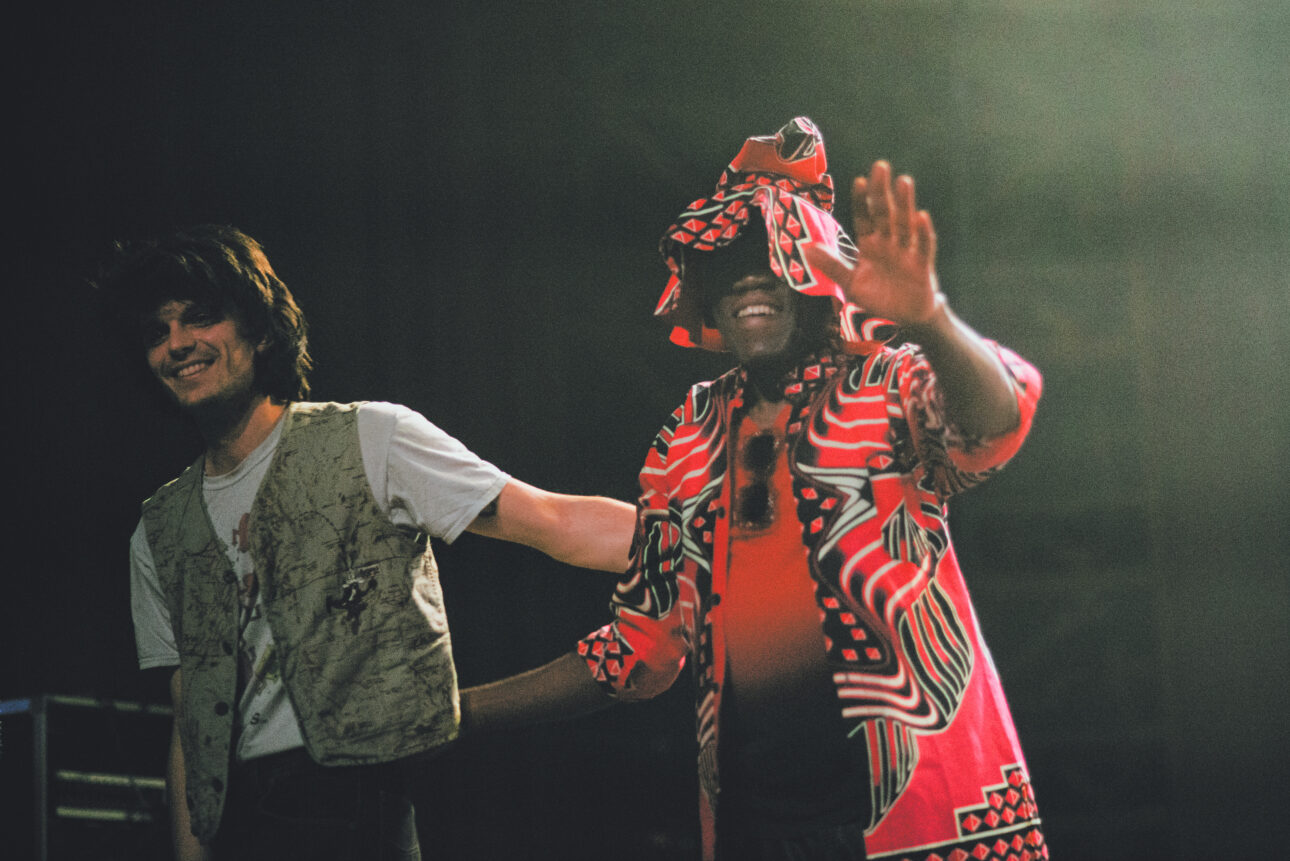
Every time the notoriously painted WITCH truck pulled into town, it was met with heaving crowds of groupies and local folks after a free ride. They were bonafide rock stars.
“Everyone in the towns knew us! It became tough to keep a handle on that! At one point we employed three deaf security guys who couldn’t speak. They couldn’t negotiate cover charges and only give signs to say, ‘You pay’ OR ‘You don’t get in!’ It was madness, but that helped us a lot.” Jagari explains.
There were other obstacles to battle past such as complicated contractual wrangles and piracy problems to secure their master tapes sold to a former manager and Zambia Music Parlour. Zambia’s economy was crashing. Conflicts in neighboring countries forced the government to declare curfews alongside power cuts, which made live gigs rare.
The band played on. They defied curfew restrictions and ignited crowds with incendiary sets playing from when the sun went down until the crack of dawn. “Sometimes we were playing from 6 p.m. to 6 a.m.,” Jagari says. “Our gigs would be so long that our roadies and ‘security’ guys would need a nap. We made a deal to tie a rope around their toe and run it out of the trunk window. When we needed them or the gig was finished, we would pull that string, and they would wake up! It was madness!”
By the end of the ‘70s, a disco inferno was blazing. Zambia’s hottest new music genre had killed off one Zamrock band after another, and Jagari saw that as his time to bow out too. “Rock pushed me to do something unusual,” he says. “But disco didn’t move me.”
At the same time, 18-year-old keyboard and synth maestro Patrick caught the band’s attention. “I was fresh out of school and my band Guys and Dolls opened for the WITCH in Lusaka – but we stole the show that day with a track called ‘Waile’,” he says. “Not long after I was on a wagon going to Botswana on tour as their newest member”
Many bands underwent wild evolutionary trajectories throughout the 1970s. Still, nothing matches the leap undertaken by WITCH from progressive, balls-to-the-wall Afro-rock to fully-fledged disco-glam, boogie-driven floor-fillers.
“The WITCH managed to reinvent itself and produced the album Moving On in 1980,” Patrick says. “People could not believe that the Zamrock band produced that! We had a track called ‘My Desire’, which hit No. 1 for six weeks on the South African charts competing with international artists like Michael Jackson! That was the level that was put into that album!”
Despite the shift in genre they continued to send out powerful lyrics. In 1980, Freedom Fighter (recently rereleased), marked the mercurial period and packed a powerful punch that united the two WITCH camps. “We were invited to be curtain raisers for Bob Marley at a historic event celebrating Zimbabwean Independence. We played in an all-white stadium. For the very first time, ALL races were allowed in. When WITCH played ‘Freedom Fighter’ and the whole stadium erupted.” Patrick says.
But by the end of the ‘80s, Zambia’s economy was plummeting and disco was dying out. “WITCH was a household name; we were known by the whole country. But we didn’t know where to take our fame next.“ Patrick says. “We had no international exposure. Managers didn’t have the contacts or understanding of how to market our music to the rest of the world. All they was a local vision. I think if WITCH could have crossed over in the 70s and 80s music history would have been very different.”
What’s more, the AIDS epidemic had killed about 13% of the Zambian adult population in just six years, and is believed to have tragically claimed all original members of Jagari’s WITCH apart from himself.
In 1988, Patrick relocated to the U.K. and pursued a new path working for the NHS for 20 years and a spiritual one by finding god. Meanwhile, Jagari got sober, strengthened his faith and worked as a lecturer and head of music at a secondary school. In the years that followed, he carved out a formidable career as an entirely different kind of rock star, mining for Amyethst and other gemstones.
WITCH slipped into obscurity, and the Zamrock movement was vanishing with it.
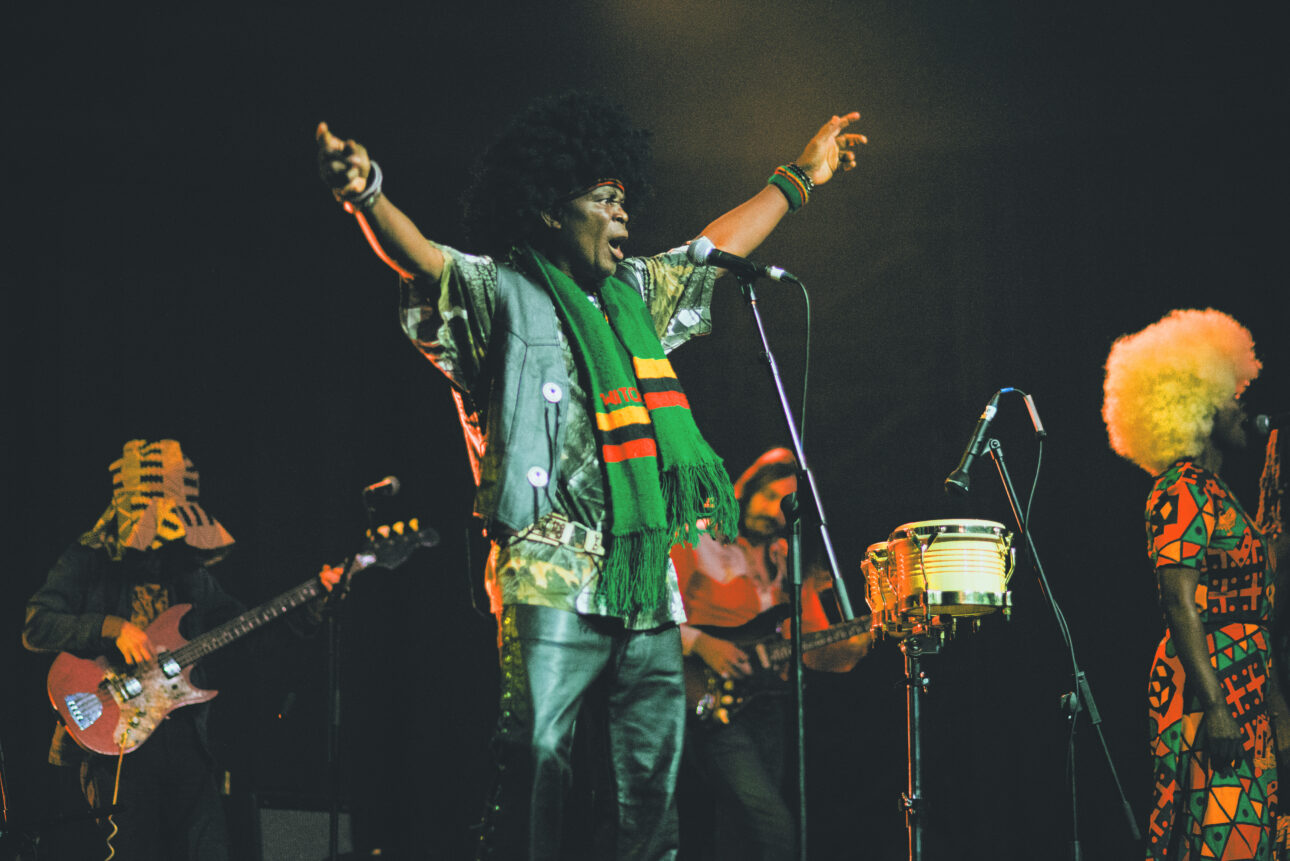
In 2011, Now-Again Records reissued a career-spanning collection of WITCH’s music and crate-diggers and music heads worldwide went wild. Including filmmaker and fan Gio Arlotta (WITCH’s current manager) who embarked on a cross-continental trip to track down Jagari and film a Zambian “Searching for Sugarman” style documentary WITCH: We Intend To Cause Havoc and get the band back together.
Following the release of Arlotta’s critically lauded 2019 documentary, a cult following of fans formed. With a new incarnation of the band in tow, WITCH veterans Jagari and Patrick have delivered thunderous performances from Los Angeles to Lusaka. They secured festival slots at Desert Daze, SXSW and Green Man. Jagari was given a lifetime achievement award by the Zambian National Arts Council, and are currently completing an Australian/New Zealand tour of super intimate gigs for a few hundred to festivals of thousands. Many of their disco tracks have been used in film and TV programs. They were invited to mark Chaka Khan’s induction to the Rock and Roll Hall of Fame – with a Zamrock-infused cover of her 1983 hit ‘Ain’t Nobody’ recorded at the legendary Hyde Street Studios in San Francisco. While the band’s defiance and edginess have led to WITCH jumping on features with new wave artists such as 29-year-old Zambian rapper Sampa the Great.
“Back in the day WITCH represented ‘We Intend to Cause Havoc’,” Patrick says. “This time around, we are the same band with we have a different message, and that is that “We Intend to Cause Harmony, Healing and bring Hope.”
“The first time back together on stage was absolutely amazing,” he continues. “It was so magical. It’s something I never imagined would happen. For me, it was something I talked about at dinner tables “That was what we did back in the day” and that was it.”
“At one time, I had given up. I was thinking music was over for me.” Jagari says before revealing his restored faith in music. “I’m a strong believer in god, and I know that he’ll keep giving me a future even at my late hour in life. “I want to bring love and put smiles on people’s faces. My dream is to have an international-level music school or studio where I can share my musical expertise and encourage people to write local music/ to show them that if we can do it, they can. I would like not to carry everything I’ve experienced to the grave.”
Desert Daze Sound (the label that the band is now signed in partnership with Partisan Records) not only united the band back into the studio. They insisted that WITCH return to DB studios in Zambia to record 2023’s Zango with the original ‘70s gear Jagari used for Lazy Bones including the same sound engineer to achieve the raw analog scratch of their most celebrated album. They fired up tape machines, some in terrible shape, and had a guy solder the guitar pedals (used 48 years ago) as they were recording.
Both of their eyes twinkle as they taunt and tease about new music on the way and some songs from the vault being reworked. Five decades later Patrick managed to finally get ‘Waile’, the song that originally locked down his spot in WITCH on wax with Jagari’s blessing.
“They say a prophet is never accepted in their hometown. It rings true.” Patrick says. “The world still knows more about Zamrock than Zambia, unfortunately. This is why our comeback and the documentary was so important, especially for me. If there was no history of the band written down, it was beginning to erode, we were losing that legacy. But now it’s cemented and there’s so much new music coming”
Zango is a testament to the band’s phoenix-like rebirth into its current supergroup-like state — and solidifies that the spell of Zamrock has lost no power despite its years of dormancy.

